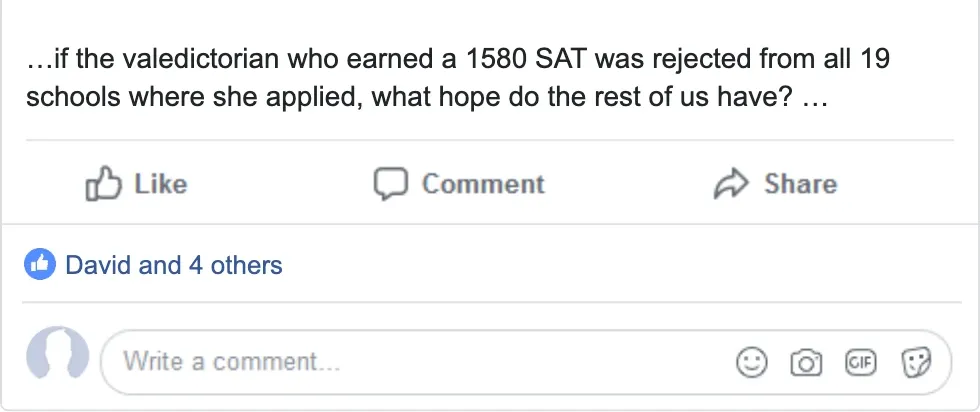For Juniors & Seniors
Disclaimer:
I’ve been teaching ambitious teens for years. I care about them and I'm beyond frustrated at the level of disengagement and overwhelm our school systems can create in ambitious teens.
But I’m an admissions expert, and also currently a Teaching Fellow for a class on leadership at Harvard.
This guide is not just a call for more sanity in our college prep. This healthier approach is also more effective at getting you accepted.
If you are reading this for the first time as a junior or senior, you are probably feeling totally overwhelmed.
Your classes in school have never been harder, and along with more advanced academics, you may be lost trying to put together a college list, request letters of recommendation (who should I ask? How should I ask? How do I know the letters will be good…?”), learning about the Common App, FAFSA, and the difference between Early Decision, Early Action, Restricted Early Action, and rolling or regular admissions.
Ah, and even if you somehow figure all of that out, you’re likely scared out of your mind because the smartest student in your school last year was rejected from most of the colleges she applied to, so… if seems like you have no choice but to work like cray to get ready to apply to college, and at the same time it seems like no matter what you do, not matter how hard you work, it won’t be enough.
If you are feeling this way, you are not alone.
And there is good news.
Because understanding just a little bit more about what colleges actually care about these days will allow you to focus your energy only on the stuff that matters. This guide will clarify what matters most for you, so you can stop wasting your time and energy in activities that won’t help you get in anyway, and refocus on the stuff that does matter, with this understanding and some focus and discipline on your part, you’ll be able to manage everything you need to and get into a great college.
US college admissions, especially among the most selective colleges, have evolved!
The old advice is no longer enough to get you into a great school.
Fortunately, there is a much more effective way to prepare for college, and you don’t have to give up your childhood for it.
The myth: What many people THINK colleges are looking for
We conducted an unscientific survey of what people thought colleges were looking for in their freshman classes. While there were a variety of answers, the three most popular, by far, were:
1. Colleges are looking for the smartest students possible.
2. Colleges are looking for the hardest-working students possible.
3. Colleges are looking for the most impressive students
The idea is that admissions officers must be reading through piles of applications, separating them into stacks, and ranking them from “smartest” to “dumbest” or from “hardest working” to “laziest…”
Once those piles are completed, the admissions officers simply take the 2,000 applications at the top of the pile (the 2,000 smartest or most impressive applicants) and reject the rest.
Fortunately, this is NOT how things are done at the most selective colleges.

I say fortunately, because when you believe this, college prep can be the most stressful thing in the world because you end up staying up late, waking up early, and burning yourself out trying to prove you are smarter, harder working, or “more impressive” than anyone else.
How do high school students prove themselves without burnout?

Preparing for the admissions process often becomes a race to see who can take the most AP or IB (advanced) classes.
Who can join the most clubs (and become president!)
or create the most clubs.
Who can earn the most awards from MUN or Math & Science Olympiad competitions…
and who can get the highest GPA and test scores.
But if ALL the ambitious students (there are tens of thousands of truly ambitious students every school year who will be applying to college) are trying to show that they are the most impressive by doing these same things …
how can you compete?
Parents of these teens fuel the anxiety when they log into Facebook groups and hype each other up about how impossible the odds are.
This is a quote from part of a post in one such Facebook group of college-bound teens:

I feel great empathy for these anxious parents.
And I feel even more compassion for the stressed-out teens.
It is true that colleges want to admit academically curious and competent students. But to be competitive for selective colleges, it is important to understand the full picture.
The good news is that when you understand the full picture, you’ll discover that being healthy and happy throughout high school actually increases your odds of being competitive for college—if you do it right.
That’s why I’ve written this guide—so that even if you are late to the game, you can still ROCK high school while becoming the kind of applicant that selective colleges fight over.
Part 2 of 7. What Colleges actually want





